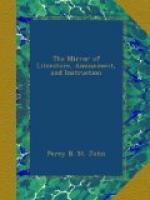“‘Put this,’ she said, holding out a branch, ’in your turban; for I am sure in some of these hollow caves and dreary chasms the ogres live; they feed their young with human blood, and they love to give them the young and beautiful. Put it in your turban, brother,—since you say I must not call you master;—and never frown,—I do not like to see it, for then you are not so handsome,—I mean, good, as when you smile. Do not laugh, but take it. It will preserve you from every spell and magic. Nothing bad dares come near it.’
“While crossing a sandy level, suddenly she started, as her eye caught some object. Without stopping her horse, which was ambling along, she sprang off, and ran up a sand hill, like a white doe. Never having witnessed any thing like this before, I was so astonished that she was returning, ere I could overtake her to ask if an ogre had lured her with his evil eye. ‘O, no,’ she cried,—’look here! You like flowers, but did you ever see any so lovely as this?—Smell it,—’tis so sweet, that the rose, if growing near it, loses its beauty and fragrance, from envy of its rival.’
“Certainly I thought she was bewitched. It was a glaring, large, red bough, full of blowzy blossoms, and yellow berries, with a musky, foeted odour. ‘Why,’ I exclaimed, ’you have as much reason to be jealous of old Kamalia, your nurse, as the rose to be jealous of such a scraggy bramble as this! Faugh! the smell makes me sick.’
“I suppose I was instigated to make this rude speech by her fondling and kissing it. Her dark eyes expanded; and she seemed, for an instant, to view me with astonishment, then with sorrow; as they closed, I perceived that their brightness was gone, and the long, jetty fringe, which arched upwards as it pressed her cheek, was covered with little pearly dew-drops. The branch fell from her hand under my feet, her sprightly form drooped, and the tones of her voice reminded me of the time when she hung over her dying parent, as she said,—’pardon me, stranger! I had forgotten you are not of my father’s land. This tree covered my father’s tent, sheltered us from the sun, and kept away the flies, when we slept in the day. Our virgins wreathe it in their hair, and, if they die, it is strewed over their graves. So, I can’t help loving it better than any thing. But, since you say it makes you sick, I won’t love it, or gather it any more.’ Then her words became almost inarticulate from sobbing, as she added,—’Why should I wear it now? I belong to a stranger!. My father is gone!’
“I need scarcely say that I not only returned the flowers, and pleaded my ignorance, but I went up to the hill, and pulled up the tree by the roots. ‘Sweet sister,’ said I, ’I was only angry with it because you abused the favoured tree of our country, the rose. But now, as the sun shines on it, and I see it nearer,’—looking at her,—’I do think the rose may envy it, as the loveliest of my country women might envy you. I’ll plant it in our garden.’




